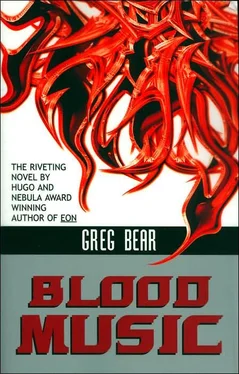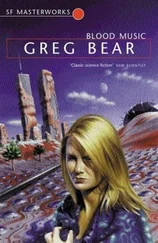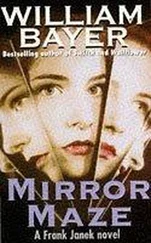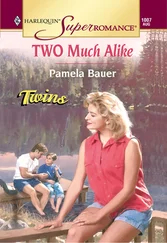Gregory Bear - Blood Music
Здесь есть возможность читать онлайн «Gregory Bear - Blood Music» весь текст электронной книги совершенно бесплатно (целиком полную версию без сокращений). В некоторых случаях можно слушать аудио, скачать через торрент в формате fb2 и присутствует краткое содержание. Город: New York, Год выпуска: 2005, ISBN: 2005, Издательство: ibooks, Incorporated, Жанр: Фантастика и фэнтези, на английском языке. Описание произведения, (предисловие) а так же отзывы посетителей доступны на портале библиотеки ЛибКат.
- Название:Blood Music
- Автор:
- Издательство:ibooks, Incorporated
- Жанр:
- Год:2005
- Город:New York
- ISBN:1596871067
- Рейтинг книги:4 / 5. Голосов: 1
-
Избранное:Добавить в избранное
- Отзывы:
-
Ваша оценка:
- 80
- 1
- 2
- 3
- 4
- 5
Blood Music: краткое содержание, описание и аннотация
Предлагаем к чтению аннотацию, описание, краткое содержание или предисловие (зависит от того, что написал сам автор книги «Blood Music»). Если вы не нашли необходимую информацию о книге — напишите в комментариях, мы постараемся отыскать её.
Blood Music — читать онлайн бесплатно полную книгу (весь текст) целиком
Ниже представлен текст книги, разбитый по страницам. Система сохранения места последней прочитанной страницы, позволяет с удобством читать онлайн бесплатно книгу «Blood Music», без необходимости каждый раз заново искать на чём Вы остановились. Поставьте закладку, и сможете в любой момент перейти на страницу, на которой закончили чтение.
Интервал:
Закладка:
“Now read it again,” Gogarty said. The message had been short enough that most of it remained in his memory. The second time he read it, however, it had changed.
Dear Sean and Paul.
Fair warning to the wise. Sufficient. Small changes now, big coming. VERY big. Gogarty can figure it out. He has the means. The theory. Others are being alerted. Spread the word.
Bernard“Every time, it’s different. Sometimes more elaborate, sometimes very concise. I’ve taken to recording what it says each time I read it.” Gogarty held out his hand and rubbed his fingers. Paulsen-Fuchs handed him the letter.
“It’s not paper,” Gogarty said. He dipped it in his tea cup. The letter did not absorb, nor did it drip upon removal. He held it in both hands and made a vigorous tearing motion. Though he carried the motion through, the letter remained in one piece, in one hand, having passed through the other hand in some unobvious fashion. “Care to read it again?”
Paulsen-Fuchs shook his head. “So it is not real,” he said.
“Oh, it’s real enough to be here whenever I want to read it. It’s just never quite the same, which leads me to believe it isn’t made of matter.”
“It is not a prank.”
Gogarty laughed. “No, I think not.”
“Bernard is not dead.”
Gogarty nodded. “No. Bernard went with his noocytes, and I believe his noocytes are in the same location as the North American noocytes. If ‘location’ is the proper word.”
“And where would that be? Another dimension?”
Gogarty shook his head vigorously. “My goodness, no. Right here. Right down where everything begins. We’re macro-scale, of course, so when we investigate our world, we tend to look outward, to the stars. But the noocytes—they are microscale. They have a hard time even conceiving of the stars. So they look inward. For them, discovery lies in the very small. And if we can assume that the North American noocytes rapidly created an advanced civilization—something that seems obvious—then we can assume they found a way to investigate the very small.”
“Smaller than themselves.”
“Smaller by an even greater factor than our smallness compared to a galaxy.”
“You are talking about quantum lengths?” Paulsen-Fuchs knew little about such things, but he was not totally ignorant.
Gogarty nodded. “Now it so happens that the very small is my specialty. That’s why I was called up for this noocyte investigation in the first place. Most of my work deals with lengths smaller than ten to the minus thirty-third centimeters. The Planck-Wheeler length. And I think we can look to the submicroscale to discover where the noocytes went, and why.”
“Why, then?” Paulsen-Fuchs asked.
Gogarty pulled out a stack of papers filled with text and equations written by hand. “Information can be stored even more compactly than in molecular memory. It can be stored in the structure of space-time. What is matter, after all, but a standing-wave of information in the vacuum? The noocytes undoubtedly discovered this, worked with it—have you heard about Los Angeles?”
“No. What about it?”
“Even before the noocytes disappeared, Los Angeles and the coastline south to Tijuana vanished. Or rather, became something else. A big experiment, perhaps. A dress rehearsal for what’s happening now.”
Paulsen-Fuchs nodded without really comprehending and leaned back in the chair with his cup. “It was difficult getting here,” he said. “More even than I expected.”
“The rules have changed,” Gogarty said.
“That seems to be the consensus. But why, and in what fashion?”
“You look tired,” Gogarty said. “Tonight, let’s just relax, enjoy the warmth, not stretch our minds beyond reading the letter a few more times.”
Paulsen-Fuchs nodded and laid his head back, closing his eyes. “Yes,” he murmured. “Much harder than I thought.”
The snow had stopped by sunrise. Daylight returned the fields and banks to unassuming whiteness. The black snow clouds had dissipated into harmless-looking gray puffs gliding on the westward wind. Paulsen-Fuchs awoke to the smell of toast and fresh coffee. He lifted himself up on his elbows and rubbed his tousled hair. The couch had served well; he felt rested, if travel-grimed.
“How about hot water for a shower?” Gogarty asked.
“Wonderful.”
“Shower-room is a bit cold, but wear these slippers, stay on the wood slats, and it shouldn’t be too awful.”
Feeling much refreshed, and certainly more alert—the shower-room had been very cold—Paulsen-Fuchs sat down to breakfast. “Your hospitality is remarkable,” he said, chewing toast and cream cheese liberally slathered with marmalade. “I feel most guilty for the way you were treated in Germany.”
Gogarty pursed his lips and waved the admission away. “Think nothing of it. Strain on everyone, I’m sure.”
“What does the letter say this morning?”
“Read for yourself.”
Paulsen-Fuchs opened the dazzling sheet of white and ran his fingers along the sharply defined letters.
Dear Paul and Sean,
Sean has the answer. Stretching of the theory, observation too intense. Black hole of thought. Like he said. Theory fits, universe is shaped. Not other way. Too much theory, too little flexibility. More coming. Big changes.
Bernard“Remarkable,” Paulsen-Fuchs said. “The same piece of whatever-it-is?”
“As far as I can tell, the very same.”
“What does he mean this time?”
“I think he’s confirming my work, though he isn’t being very clear. If, that is, the note reads the same way to you as it does to me. You’ll have to record what you’ve read for us to be sure.”
Paulsen-Fuchs wrote down the words on a sheet of paper and handed them to Gogarty.
The physicist nodded. “Much more explicit this time.” He put down the paper and poured Gogarty more coffee. “Very evocative. He seems to be confirming what I said last year– that the universe really has no underpinnings, that when a good hypothesis comes along, one that explains the prior events, the underpinnings shape themselves to accommodate and a powerful theory is born.”
“Then there is no ultimate reality?”
“Apparently not. Bad hypotheses, those that don’t fit what happens on our level, are rejected by the universe. Good ones, powerful ones, are incorporated.”
“That seems most confusing for the theoretician.”
Gogarty nodded. “But it lets me explain what’s happening to our planet.”
“Oh?”
“The universe doesn’t stay the same forever. A theory that works can determine reality for only so long, and then the universe must ring a few changes.”
“Upset the apple cart, so we do not become complacent?”
“ Yes indeed. But reality can’t be observed to change. It has to change at some level not being fixed by an observation. So when our noocytes observed anything and everything to the smallest possible level, the universe was unable to flex, to reshape itself. A kind of strain built up. They realized they could no longer conduct themselves in the macro-scale world, so they… well, I’m not at all sure what they did. But when they departed, the strain was suddenly released and caused a snap. Things are out of kilter now. The change was too abrupt, so the world has been shifted unevenly. The result—a universe that is inconsistent with itself, at least in our local vicinity. We get burning snow, unreliable machines, a gentle kind of chaos. And it may be gentle because—” He shrugged. “More cracked pottery, I’m afraid.”
“Let’s hear it.”
“Because they’re trying to save as many of us as they can, for something later.”
“The ‘Big Changes.’ “
Читать дальшеИнтервал:
Закладка:
Похожие книги на «Blood Music»
Представляем Вашему вниманию похожие книги на «Blood Music» списком для выбора. Мы отобрали схожую по названию и смыслу литературу в надежде предоставить читателям больше вариантов отыскать новые, интересные, ещё непрочитанные произведения.
Обсуждение, отзывы о книге «Blood Music» и просто собственные мнения читателей. Оставьте ваши комментарии, напишите, что Вы думаете о произведении, его смысле или главных героях. Укажите что конкретно понравилось, а что нет, и почему Вы так считаете.












